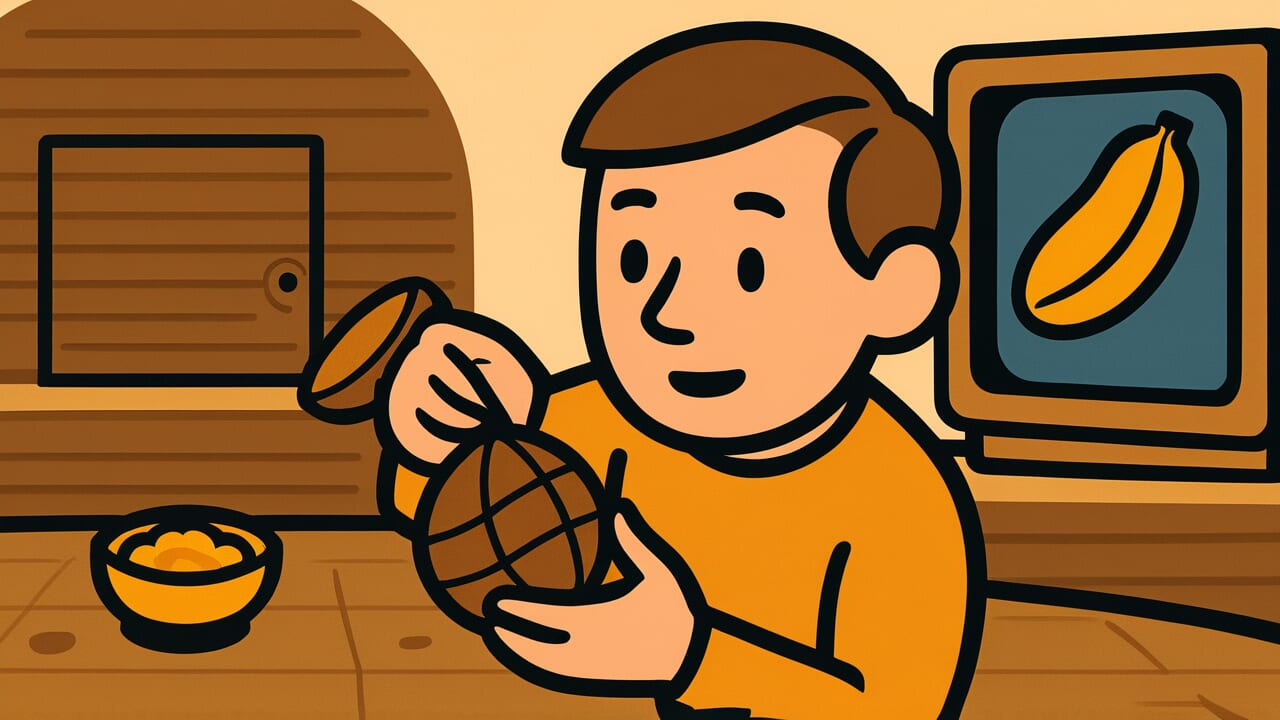How to Read “He must crack the nut that would eat the kernel”
He must crack the nut that would eat the kernel
HEE must krak the nuht that wood eet the KER-nuhl
The word “kernel” refers to the edible part inside a nut’s shell.
Meaning of “He must crack the nut that would eat the kernel”
Simply put, this proverb means you must do the hard work to get what you want.
The literal words paint a clear picture. Someone wants to eat the sweet kernel inside a nut. But first, they must crack through the hard shell. The shell protects the good part inside. Without breaking it open, the kernel stays out of reach.
This wisdom applies to almost everything we want in life. Getting good grades means studying hard subjects. Building strong friendships requires honest conversations. Earning money involves working through difficult tasks. The “cracking” represents the effort we must make. The “kernel” represents our goal or reward.
People often realize this proverb reveals a basic truth about achievement. Nothing worthwhile comes without some kind of struggle first. The harder the shell, the sweeter the reward inside. This doesn’t mean suffering for no reason. It means accepting that good things require us to push through challenges.
Origin and Etymology
The exact origin of this proverb is unknown. It appears in various forms across different time periods. Early versions focused on the simple truth that nuts require cracking. This made the saying easy to remember and share.
During earlier centuries, nuts were important food sources. People understood the work needed to access their nutrition. Cracking nuts was a daily task in many households. The comparison between physical work and life’s challenges felt natural. Everyone could relate to the effort required.
The saying spread through oral tradition and written collections. Different regions developed slight variations of the same idea. Some versions emphasized the person doing the work. Others focused on the reward waiting inside. Over time, the core message remained the same across cultures.
Interesting Facts
The word “kernel” comes from Old English “cyrnel,” meaning a small seed or grain. It originally referred to any small, hard center of something larger. The connection between kernels and valuable cores appears in many languages.
This proverb uses a simple cause-and-effect structure that makes it memorable. The “must” creates urgency, while “would” shows desire. This grammatical pattern appears in many traditional sayings because it’s easy to remember.
Usage Examples
- Mother to teenage son: “You want that scholarship but won’t study for the entrance exam – he must crack the nut that would eat the kernel.”
- Manager to employee: “She keeps complaining about her salary but refuses overtime opportunities – he must crack the nut that would eat the kernel.”
Universal Wisdom
This proverb captures a fundamental truth about how the world works. Valuable things are often protected by barriers. Nature designed nuts with hard shells to protect their seeds. Similarly, life’s best rewards hide behind challenges that test our commitment.
The wisdom reveals something important about human psychology. We tend to value things more when they require effort to obtain. Easy rewards often feel less satisfying than hard-won victories. This isn’t just cultural conditioning. It reflects how our minds process achievement and meaning. The struggle itself becomes part of the reward’s value.
The proverb also exposes a common human tendency to want results without work. We see the kernel and wish it would appear without the cracking. But this desire fights against reality’s basic structure. Growth requires resistance. Strength develops through challenge. Skills improve through practice. The “cracking” isn’t punishment for wanting something good. It’s the natural process that makes the reward possible and meaningful.
When AI Hears This
Modern humans have developed a strange mental split about getting what they want. They desire the kernel but feel annoyed by the shell. This happens because daily life hides the work behind most things we consume. Food appears in stores without showing the farming. Products arrive without revealing the manufacturing process.
This creates a deeper problem with how people think about fairness and effort. When barriers appear, they feel cheated rather than challenged. The mind starts believing that wanting something creates a right to have it easily. This explains why people get frustrated with passwords, waiting in lines, or learning new skills. They unconsciously expect the world to remove obstacles for them.
What fascinates me is how this mental pattern actually protects human motivation. If people fully grasped every barrier before starting, they might never begin difficult tasks. The brain tricks itself into optimism about easy success. This delusion drives humans to attempt challenging goals they might otherwise avoid. Sometimes the best way to crack tough nuts is to underestimate how hard the shell really is.
Lessons for Today
Living with this wisdom means accepting effort as part of every worthwhile goal. The key insight isn’t just that work is necessary. It’s that the work and the reward connect in meaningful ways. The skills you develop while “cracking” often matter as much as what you find inside.
In relationships, this understanding changes how we approach difficulties. Arguments and misunderstandings aren’t signs of failure. They’re opportunities to crack through surface-level connections. The deeper intimacy that follows often justifies the uncomfortable conversations. The same applies to personal growth. Facing our weaknesses feels hard, but it’s the only path to genuine strength.
The challenge lies in distinguishing between productive effort and pointless struggle. Not every hard shell contains a valuable kernel. Wisdom involves learning which nuts are worth cracking. Sometimes the smartest choice is walking away from shells that contain nothing worthwhile. But when you identify something truly valuable, this proverb reminds you that the work ahead isn’t optional. It’s the price of admission to everything worth having.



Comments